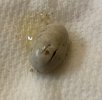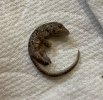Omri
New Member
- Messages
- 3
- Location
- California
I breed Eurydactylodes (small New Caledonian geckos) and had a strange death in my latest clutch. Both eggs looked the same, were in the same conditions, and seemed fine. Two days ago one of them hatched (this hatchling is doing well) but there was no sign of hatching from the second one. I candled the egg and the hatchling was clearly moving around inside. I cut a small hole in the egg and immediately the gecko cut its own, larger hole and began squirming around. I left it in the incubation box and came back in a couple hours. The gecko was still in its egg and had made a couple more slits, but was not moving, even when I poked it.
A few hours later I come back to find the gecko in the same position, completely lifeless. I took it out of the egg to examine it, and it looks like a healthy, fully formed hatchling. It even weighs slightly more than the one that lived. No visible injuries or defects. Inside the egg there was a few bits of brown goo and the remnants of the yolk + umbilical cord. I’ve seen these things in other eggs but this looked like a bit more than usual (this could be because I usually don’t look inside eggs that are so freshly hatched). I’ve never cut an egg before but I don’t think I did it wrong.
Does anyone know what could cause a fully-developed hatchling to begin hatching and then die? I don’t think it’s a problem with my incubation setup because this is my first stillborn, my best guess is that it had some internal issue that killed it as soon as it began breathing.
Photo from right after the initial cutting and pipping:

Dead gecko (not graphic):
A few hours later I come back to find the gecko in the same position, completely lifeless. I took it out of the egg to examine it, and it looks like a healthy, fully formed hatchling. It even weighs slightly more than the one that lived. No visible injuries or defects. Inside the egg there was a few bits of brown goo and the remnants of the yolk + umbilical cord. I’ve seen these things in other eggs but this looked like a bit more than usual (this could be because I usually don’t look inside eggs that are so freshly hatched). I’ve never cut an egg before but I don’t think I did it wrong.
Does anyone know what could cause a fully-developed hatchling to begin hatching and then die? I don’t think it’s a problem with my incubation setup because this is my first stillborn, my best guess is that it had some internal issue that killed it as soon as it began breathing.
Photo from right after the initial cutting and pipping:

Dead gecko (not graphic):

